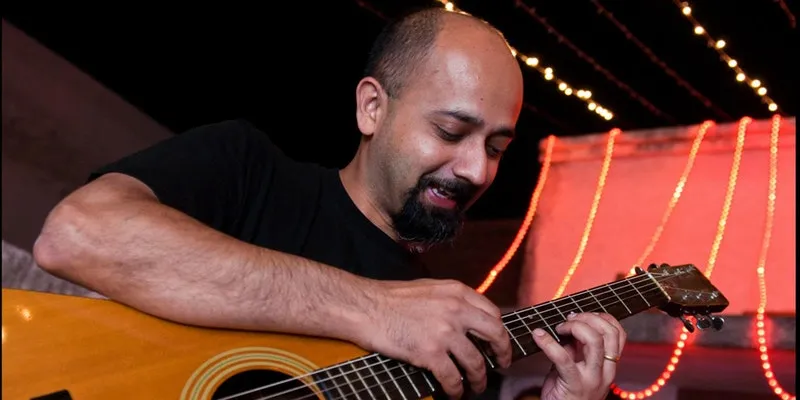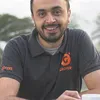From CMO to accidental entrepreneur, how Social Catalyzers’ Kalyan Kumar built a profitable digital marketing startup
Social Catalyzers’ Co-Founder Kalyan Kumar went from living in a villa to a shared apartment. It seemed like he had hit rock bottom. But he turned things around and went on to build an extremely profitable digital marketing startup.
Kalyan Kumar is not your typical IIT-IIM grad. Self-admittedly a backbencher and a “rock and roller” all his life, Kalyan’s story is about several unplanned events coming together like the pieces in a puzzle.
With child-like enthusiasm, the 43-year-old recounts, “I was a backbencher; I was into rock and roll. At IIT-Delhi I did not study; I was busy organising music shows on campus and across the city. I had become the rock-and-roll godfather on campus.”
He was able to sell the idea of these gigs to sponsors, which would lay the early seeds for his later life as a marketeer. Kalyan’s musical influence came from his time in the hills of Darjeeling, when he was a boarding school student at Goethals Memorial School, Kurseong.
In college, he formed his own rock-and-roll band, called ‘Mixed Fruit Jam’, for which he was the vocalist and played the guitar. Mixed Fruit Jam covered songs by bands such as Nirvana, Guns N’ Roses, and Pearl Jam.

Social Catalyzers Co-Founder Kalyan Kumar is most definitely not your typical IIT-IIM grad.
Kalyan would have you believe that his time at IIT-Delhi was spent on everything but academics. But that would perhaps not be the most accurate summation of his time there. In his final year, Kalyan was awarded the Padmashri Manmohan Suri Project Award for the best innovative hardware-oriented Major Project in Mechanical Engineering for inventing a new welding technology.
“But I was not interested in doing mechanical engineering or pursuing a job in that area,” he says.
Through his four years at IIT, Kalyan became closely associated with the Rock Street Journal (inspired by the Rolling Stones magazine) and would help them do “anything” in the city, from managing events to getting sponsorships, as a “soldier of passion.”
So when Kalyan was graduating from IIT-Delhi in 1998 with a degree in mechanical engineering, Rock Street Journal (RSJ) offered him a job to come on board full-time as Manager, Events and Promotion. He would go on to work there for three years (his total association spanning seven years, including the college stint) and be instrumental in launching the Great Indian Rock Festival.
During his stint at RSJ, Kalyan would appear for CAT, the MBA entrance test conducted by the IIMs, every year. “I would just appear with my friends, mostly to keep them company,” Kalyan says.
Proving the adage “third time’s a charm” right, in his third attempt, Kalyan made it to IIM-Calcutta. He studied marketing with a focus on behavioural science there. During campus placements at IIM-Calcutta, he would end up being the only guy to be picked by Sify where he would go on to launch online gaming in India with the company’s iWay cafe chain.
After a two-and-a-half year stint there, Kalyan went on to work in senior marketing roles at Vodafone Hutch, OnMobile, and Virgin Mobile before becoming the CMO for Australian gaming company PlayUp. After that, he served as the CMO for Mumbai-based Rummy Circle and then as a director-partner at Gurugram-based marketing agency Vivify.
A pivotal meeting
While Kalyan was at Vivify, he happened to meet Vaibhav Gupta during the 2014 Coca-Cola FIFA World Cup trophy tour. Vaibhav was a social media influencer for Coke, while Kalyan as a part of Vivify was working with the soft drink giant on the tour in four countries: Bhutan, Bangladesh, Nepal, and India.
The meeting came at a crucial time in Kalyan’s life, which was at the proverbial crossroads. He was not in a “good space” in life, Kalyan admits. He was going through a divorce and felt professionally unfulfilled as well. “I was trying to figure out my life, get things back in place. I was going through my divorce and I did not want to take up another CMO job,” he says.
That is when Vaibhav suggested the idea of putting a digital marketing startup together. “He (Vaibhav) said, 'you know so many people, so many brands; half the digital heads in the industry today you have worked with and hired. You should have your own startup',” Kalyan reminisces.
And so, Kalyan and Vaibhav in 2015 set up Social Catalyzers. It was formally launched as a company in 2016 with an aim to drive organic brand advocacy and “perfecting the science and art of virality”.
The agency drives the desired depth and reach for effective message amplification of branded content through a network of over 1,000 credible and brand relevant influencers - from across categories including celebrities (celebrity chefs, TV stars, anchors, movies stars and regional celebrities), and through native seeding into variety of social communities across the internet.
1564649652741.jpg?fm=png&auto=format)
Vaibhav Gupta and Kalyan Kumar started Social Catalyzers to "perfect the science and art of virality".
“Social Catalyzers organically propels highly contextual and well-researched content for dissemination across social media channels including but not limited to YouTube, Facebook, Twitter, and Instagram. This is done riding on influencers, YouTubers, and communities. We have pioneered algorithmic approaches to innovative new solutions like Speed ORM (online reputation management),” Kalyan says.
The startup also offers a gamut of ancillary services that solve customer pain points such as driving traffic, app installs, user engagement, and digital PR.
The company competes with the likes of Gurugram-based Eleve Media and Mumbai-based Buzzerati, a part of Fork Media.
Profitable from the start
Even before the company was incorporated, Social Catalyzers had bagged its first contract worth Rs 20 lakh.
Kalyan explains, “I knew the digital head for Bacardi; I had hired him for Virgin Mobile back in 2008. I told him we may have something (digital marketing solutions) that is better than what you have and requested him to meet Vaibhav.”
Vaibhav came back with Social Catalyzers’ first contract. Their first gig came in the form of creating Twitter campaigns for Bacardi’s NH7 Weekender, the annual multi-city music festival. With a look of satisfaction, Kalyan says, “Bacardi realised we were 40 percent cheaper than their existing vendor and were doing a cleaner job.”
On the professional front, Kalyan’s entrepreneurial journey had got off to a good start, but personally he was still going through “major struggle”. Kalyan elaborates, “From living in a villa to no car, no money, and living in a shared house with roommates. I had really taken a big fall. My marriage of 10 years was ending and my finances were in doldrums.”
But slowly, Kalyan pieced back together both his finances and his personal life.
Today, Social Catalyzers serves clients such as Amazon, Unilever, P&G, Coca-Cola, Mondelez, Nestle, Asian Paints, Adidas, and Xiaomi. It also actively works with big agencies such as Dentsu, IPG, and GroupM.
The company has been profitable since its inception. In its first year of operations, the Gurugram startup managed to clock revenue of Rs 2.3 crore, 60 percent of which formed the bottomline. Since then its revenue has steadily grown. Last year, it hit a topline of Rs 11 crore, 40 percent of which made up for the net profit.
Social Catalyzers has expanded its overseas network to countries such as Malaysia, Indonesia, and Singapore by serving clients there. It has also executed offsite projects in Vietnam, Thailand, Lebanon, Kenya, and Israel. Recently, it opened its first office outside India in Indonesia, and hired a team of four.
Eyeing growth and scale
The startup began with Kalyan and Vaibhav putting in Rs 50,000 each as capital. After four years of being bootstrapped, the company now wants to look at raising funding of around $2 million in the next three to six months.
“Now we have to hire to grow, and scale our tech. And for that we need funding. Two big companies have already shown interest in investing,” says Kalyan.
For the first two years, the company survived with just one hire. At present, the team size is 17, with 14 full-time employees.
Speaking on the tech the company plans to deploy, Kalyan says, “What we are trying to do is build an intelligent dashboard on influencer marketing, which will be end to end. You can plan your campaign, see how it is going, and finally see the outcome. It will also have an intelligence layer to tell you how your campaign can perform better. We have also started serious explorations on exploiting gamification-led approaches on content and influencer marketing while cross pollinating behavioural science aspects into the same.”
(Edited by Teja Lele Desai)











